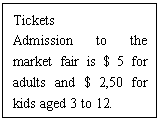题目内容
Like Old Times
Sunday, July 22,2007
 What would it have been like to be a kid in the Washington area in the mid-1700s?
What would it have been like to be a kid in the Washington area in the mid-1700s?
First of all, forget about computer and video games. But if you want to get a better sense of that time in history, head out today to Clause Moore Farm for the summer market fair. You can assemble with the Virginia militia, try your hand at spinning wool or just find a spot in the shade to enjoy some roasted chicken and summer singing. Food, beverages and other items familiar to people in the 1700s will be available for sale.
Attention:
The fair runs today from 11am. To 4:30 pm. The farm is at 6310 Georgetown Pike. For more information, call 703-442-7557 or go to http//www.1771.org. Strathmore is located at 5301 Tuckerman Lane. For more information, to http://www.Filmfestnih.org.
1.The advertisement aims to tell people ___________.
A.to spend the hot summer in a cool place-Clause Moore Farm
B.to the summer market fair to buy something cheap
C.to Claude Moore Farm to eat delicious food
D.to go to the summer market fair to experience the mid-1700’s life
2.If you go to Claude Moore Farm for the summer market fair, you can’t _________ there.
A.play video games B.spin the wool
C.eat roasted chicken D.experience part of militia’s life.
3.Mr. Brown and his family are going to the summer market fair including Mrs. Brown, five-year-old Mike, and 15-year-old Jenny, how much will they have to pay for the tickets?
A.$ 17.5 B.$ 12.5 C.$ 25 D.$ 22.5
4.You can go to the summer market fair at any time today except ___________.
A.2:00pm B.3:00pm C.10:30 am D.11:00am
DAAC
